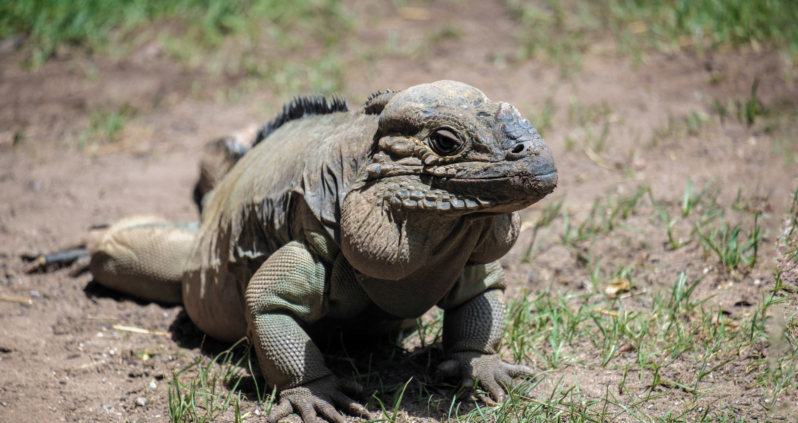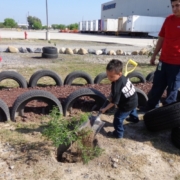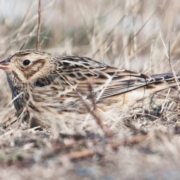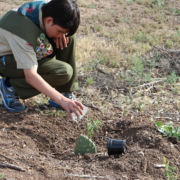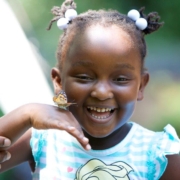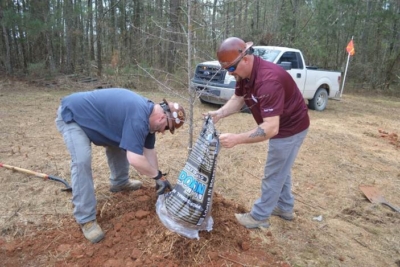CEMEX | To Know and Love Iguanas and Dry Forests – A Community-First Program to Create and Empower Conservationists
For any community-oriented conservation program to succeed, participants need to develop an acute sense of local needs and respond accordingly. This becomes especially true when working with a community facing intractable challenges.
Since 2000, CEMEX has held a lease with the Dominican government to operate a gypsum mine in Las Salinas, a town in the Barahona province of the Dominican Republic. The site is in the southwestern part of the country and within the La Florida-Las Salinas biological corridor, which extends from Barahona to the province of Independencia at the country’s western edge. Since 2013, CEMEX employees and partners have worked to restore local dry forest and wetland habitats to support the Hispaniolan slider turtle and two endangered species of rock iguana, the rhinoceros iguana and the Ricord’s iguana. These endemic reptiles face multiple threats, including poaching, overgrazing and habitat destruction caused by the construction of charcoal kilns in the forest. In response, the CEMEX team has conducted extensive outreach in the area, not only increasing awareness of these species’ plights, but also guiding community members toward more sustainable livelihoods.
To carry out this work, CEMEX works closely with Grupo Jaragua, a nonprofit which serves as the BirdLife International partner in the Dominican Republic. Technical knowledge about reforestation is limited in the region, so Grupo Jaragua biologists have, using trial-and-error, developed their own approach, and they are currently testing goat-proofing methods to address the threat of overgrazing. The forested areas now feature trees like the gumbo-limbo and roughbark lignum-vitae, as well as native cacti. These species are well-adapted to the low levels of precipitation characteristic of the region, and therefore need no irrigation or pruning once they’ve established. Through mindful species selection and a dedication to adaptive management, the team has come to manage 36,077 acres of forest, located in two parts of the biological corridor.
These forests, which feature loose soil and rocky areas, provide critical shelter and nesting ground for rock iguanas. To address the anthropogenic threats that these species face, the CEMEX-Grupo Jaragua team conducts targeted outreach. A team of community members has been trained to report evidence of hunting or charcoal kilns to authorities, helping to increase vigilance in remote, hard-to-monitor areas. Since most iguaneros (iguana hunters) are teens or young adults, the team has partnered with over 15 schools in the area, proactively conducting iguana-themed lessons for 7-to-12-year-olds. These lessons introduce youth to the concept of endemic species and their importance, and discuss the threats, including poaching and dry forest destruction, that local iguanas face.
CEMEX and Grupo Jaragua also educate the public about the importance of forest and iguana conservation during environmental fairs, both in their area and in the Dominican capital of Santo Domingo. During these events, a team member dresses as the project mascot, Rina the Rhinoceros Iguana, and greets young attendees. Andrea Thomen, a project manager with Grupo Jaragua, says, “Rina has allowed us to make learning about reptiles entertaining and memorable. It is incredible to see a child’s reaction when they first see the costume.” Because of COVID-19, the team hasn’t been able to conduct in-person programming since Spring 2020, but they hope to resume later in Fall 2021, and meanwhile have remained dedicated to this outreach, pivoting to produce digital learning materials for area teachers.
While increasing awareness has been a key component of their awareness campaign, the team has also addressed the socioeconomic factors that lead people into unsustainable professions. Andrea explains that “the development of alternative livelihoods is not easy for this region, given the high levels of poverty and lack of employment opportunities,” but that the team has promoted green jobs in the area, such as ecotourism and forestry work, as viable alternatives to unsustainable activities. In addition to the iguaneros, they have also worked with regional fishermen’s associations to dissuade fishers from hunting ducks and the endangered Hispaniolan slider turtles that live in the Laguna Cabral wetlands. About 70 households have participated in the alternative livelihoods program so far, performing paid reforestation work in the region, and community members interviewed for a recent documentary indicated that their attitudes toward wildlife have changed significantly.
These successful restoration and education efforts have earned the program the Certified Silver level of WHC Conservation Certification®, and two WHC Awards: the 2018 WHC Reptiles and Amphibians Project Award and the 2021 WHC Forest Project Award. Dania Heredia, Legal & Sustainability Director for the Dominican Republic, Puerto Rico and Haiti Cluster of CEMEX, says that these achievements demonstrate that “operating and conservation are activities that can coexist when they are legitimately believed in,” and notes that the team’s biodiversity efforts have strengthened the company’s relationship and engagement with the community and key stakeholders.
Andrea attributes the success of the program to the team’s flexible, multi-faceted approach, stating that their efforts “continue to evolve and adapt to new challenges, obstacles and lessons learned.” Dania adds in that support from leadership is crucial. She has used the program’s success to encourage high-level involvement, emphasizing that “awareness and resources must come from executives and cascade down to employees” for conservation work to succeed.
Moving forward, the CEMEX-Grupo Jaragua team plans to build on this success, continuing to transform their regional efforts into a countrywide campaign. They hope to integrate the Laguna Cabral wetland into national conservation programs, and to leverage the success of their forest and reptile conservation through the press and social media. Andrea says that, “we think that all Dominicans should know, love and aim to conserve iguanas and dry forests.” Given their dedication to addressing environmental issues at the root, and willingness to continuously grow the program, CEMEX and its partners are already making strides toward becoming national conservation leaders.
Related Content
Blogs:
WHC Webinars:
- 5 Innovative Approaches to Habitat Regeneration
- Conservation Can’t Afford to Pause: Keeping Projects Going with Limited Access
- Monitoring for Reptiles and Amphibians
- Slow and Steady Can Win: How Investing in Turtle Conservation Projects can Protect these Vulnerable Species
White Papers:
- The Conservation Connection
- The Critical Role of the Private Sector in Species Recovery and Protection
Project Guidances:
- Awareness and Community Engagement Project Guidance
- Forest Project Guidance
- Reptiles and Amphibians Project Guidance
Quick Facts
| Category: | Member Spotlight |
|---|---|
| Tags: | Awareness and Community Engagement, forest, Reptiles and Amphibians |
| Site Location: | Las Salinas, Barahona, Dominican Republic |
| Partners: | Comunitarios Voluntarios de Jaragua, Grupo Jaragua, INDECO, Ministry of Environment and Natural Resources, National Ramsar Committee |
| Certification Since: | 2017 |
| Certification Level: | Silver Certified |
| WHC Index Link: | Learn more about this program |
